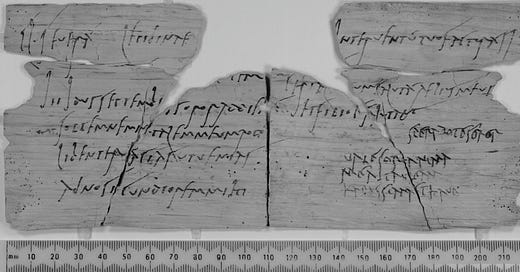Hello and happy Thursday to you!
Last week, we met a 3rd-century British woman called Saturnina who threw a curse tablet into the waters of Mercury’s temple in Uley, Gloucestershire. By looking at women’s history through women’s writing (and not by reference to anything else), we shared an intimate moment with Saturnina; a private moment between her and a deity after she became the victim of a crime.
Today, I want to share with you another private moment from early Britain. Again, it comes from Roman Britain but, this time, we’re going further north to a fort called Vindolanda, located just south of Hadrian’s Wall and occupied from 85 AD to at least the 5th or 6th century.
Diversity in Roman Britain
This is a good moment for us to remember just how diverse Roman Britain would have been. And remember, too, that Vindolanda was a military base. If you’ve ever spent time on a base (I’ve lived on three of them), you’ll know how diverse they are. While there are divisions of rank, you’re thrown into this community, meeting people from all kinds of places and all walks of life. People come and go all the time, too, but somehow the sense of community never fades.
Anyway, the woman we’re meeting today – Claudia Severa - was a Roman citizen, married to a Roman prefect called Aelius Brocchus. Also stationed at Vindolanda were other nationalities, including (modern) Belgian, French, Spanish and Dutch, but as you might expect, the Romans were very prominent. How long Claudia and Aelius stayed at Vindolanda, we don’t know, but we do know some intimate details of their life thanks to this amazing document that Claudia left behind.
This document is a birthday party invitation, written sometime between 97 AD – 105 AD. So this is early, some two centuries before Saturnina. The invitation is written in ink on a piece of wood that had been milled into two thinner, flat pieces. These pieces could then be ‘folded’ like a modern letter and an address written on the back. Regardless of nationality, the residents of Vindolanda used locally-sourced wood and made ink from local materials, usually water, carbon and gum. Here is the invitation, housed today at the British Museum:
Here's the text:
Claudia Severa to her Lepidina greetings. On 11 September, sister, for the day of the celebration of my birthday, I give you a warm invitation to make sure that you come to us, to make the day more enjoyable for me by your arrival, if you are present (?). Give my greetings to your Cerialis. My Aelius and my little son send him (?) their greetings. I shall expect you, sister. Farewell, sister, my dearest soul, as I hope to prosper, and hail. To Sulpicia Lepidina, wife of Cerialis, from Severa.
Small But Powerful
Claudia’s birthday party invitation is a landmark moment for us, as herstorians. It’s probably the oldest piece of women’s writing in Britain. While most of the tablet was written by a scribe, the last four lines were written by Claudia herself. On top of that, it’s also the oldest example of a woman’s writing in Latin.
It’s a small document but it reveals big details about Vindolanda and the people who lived there. For a start, they were literate. Letter-writing, of both military and personal natures, was woven into the fabric of daily life and supported the creation and maintenance of community. (While the excavations of Vindolanda are ongoing, archaeologists have found two more letters written by Claudia, as well as letters from the recipient, Sulpicia, and many, many examples from across the whole community).
It’s unlikely that Claudia and Sulpicia were biological sisters, but clearly, the bonds of sisterhood ran deep between them. Again, if you’ve ever experienced life in a military camp, you’ll know that this happens all the time. The friendships forged in these communities are often long-lasting and very meaningful. We can look at some of their other letter if you’d like to deep-dive into these women - hit reply and let me know.
And last but by no means least, as someone who loves astrology and being a Virgo Sun, I’m DELIGHTED that the first example of a woman’s writing in Britain comes from a fellow Virgo 😂😛 ♍
Until next time,
Kaye x






